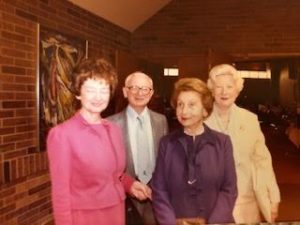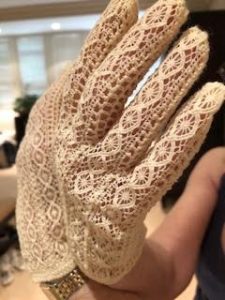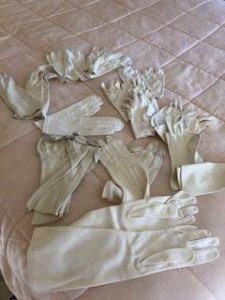
Aunt Ann
My mother and her two sisters had excellent manners. They always knew what to wear for any occasion, how to behave, how to write a lovely thank you note. Very proper women. And these they taught to their children as well. I used to call them the “white glove ladies”, as you can see from the Featured photo of my Aunt Ann, my mother’s oldest sister, with her beloved great granddaughter at a family bat mitzvah. I love that she was still wearing gloves to temple in 1984.
I remember going out to nice restaurants at a very young age and always sitting properly, no shenanigans allowed. I knew what spoon and fork to use, to immediately put a napkin on my lap, to say “please” and “thank you”, not speak with my mouth full of food, wait my turn in conversations, try to have something intelligent to add to the conversation. Keep my nails clean, be well-groomed.
That was part of my upbringing. I was bred to be a Lady. It meant that I would feel comfortable in any social occasion, though I was shy so frequently didn’t enter the conversation unless invited, and didn’t have good small talk. That was a different skill set that I acquired later in life. That required the ability to actively listen to others and ask questions; show interest. I thought it showed “class”, but came to realize how biased that impression was. Anyone could have good manners. It spoke more about upbringing than being “classy”. It spoke to the values of the adults around you and your ability to integrate them into your own value structure.
I tried to pass these values on to my children, but this is an entirely different era. The Internet and social media have intruded in all sorts of ways. Writing thank you notes is definitely a lost art, but I think table manners should not be. I might have won that battle. Not just at the table, but in general. I see my London son with his girlfriend and I take heart. She tells me that I raised a good man, kind and empathetic, and I am ecstatic. My daughter is on the autism spectrum which is marked by social difficulties. We have worked on social interactions her whole life. She is attuned to some things, others, not so much. We recently had a talk about de-escalating in tense situations. She said she has learned to do this. I’m not sure if that is related to manners, but it is a learned and excellent skill; one that I need more practice at.
Yet, as I think more deeply about this prompt, I’ve come to realize the “manners” I ticked off in my opening remarks are superficial and exterior. They don’t define the person. What is interior does. How one treats another human being can, more rightly, define you. Do you treat others with dignity and respect, show compassion? Then, truly, you have good manners. Do you make others feel good about themselves; treat them with empathy, kindness, bring them joy? Shouldn’t that bring you joy too? I would like to posit that doing all of the above would be having good manners. Model those for your offspring or those in your care, or about whom you care and we would all be living in a better world.
Retired from software sales long ago, two grown children. Theater major in college. Singer still, arts lover, involved in art museums locally (Greater Boston area). Originally from Detroit area.






I love the way you address the passage of “good manners” from your mother and her siblings to you and then on to your children. In all cases, carefully extolling the virtues of having these “good manners.”
And then, in the last paragraph, you re-examine the whole issue and make a very profound observation that in many ways rejects everything said before then. No, you do not say that good manners are bad, but, rather, that what constitutes “good manners” needs to be much more than just superficial exterior behavior. It should include treating others with empathy and kindness. And, in turn, these are the “good manners” that should be passed on to our children. How true, and thank you for making this important point.
And, superficial or not, I love the photo of the white gloves.
Thank you, John. As noted, I think having what might be defined as traditional “good manners” is important, but not defining. Those are your road map on how to behave in the world and how others view YOU. But how one TREATS others is even more important in creating a fair and just world; the kind of world we want for ourselves and others. I had thought this through as that distinction became clear to me.
Glad you liked all my white gloves. I think I even have a pair of my own, hidden away in some drawer that I din’t bother to pull out. These are all together, so they were easy to find. They are quite elegant, but I’ve never worn them. I don’t think anyone does any longer. Maybe long ones to some elegant event.
I do treasure my long white gloves that I wore, along with my feather boa, to be a cabaret singer, and look forward to wearing them again when it is safe to do another cabaret performance!
You looked so beautiful, dressed for the cabaret, Suzy! Those long white gloves and boa are spectacular. It will be wonderful when we can all perform again.
Yes, manners are really more caring about others than using the right fork and spoon. As John said, not just about superficial exterior behavior, but about empathy and kindness. I, too, loved the white gloves photo.
Thank you, Michael – for caring and for enjoying my photo of white gloves!
You are so right Betsy, kindness comes with no cost and doesn’t even need the white gloves.
Glad you agree, Dana.
Great essay, Betsy, and I applaud you for going into depth about the real meaning of manners. It’s what’s in someone’s heart and how they interact with people that counts. Love the white glove photo, which made me smile. As a child I wore them to synagogue and also to theater matinees on Broadway.
Thank you, Marian. Yes…what’s in someone’s heart! I’m so happy that everyone loves the white gloves photo. I wore them to temple, but didn’t get to Broadway until I was in college and gloves were definitely out by then. Now I really will have to do a deep dive into my own box and see if I still have a pair of my own gloves. If so, I will put them on, have my husband photograph them on my hands and add them to my story!
Found my teen-years Temple gloves, Marian. Took a new photo (not great) and have added them to the story.
Wonderful story, Betsy. Like others, I love the white gloves, and the fact that your Aunt Ann was still wearing them to temple in 1984. You are right about how times have changed, but I think it is still important to have good manners. Nice that your son’s British girlfriend appreciates how you raised him. I think “don’t talk with your mouth full” and “don’t interrupt” are timeless, and I hope children today are still being taught those things.
Thank you, Suzy. I agree, some manners should just be universal. And it was truly awesome when David’s girlfriend said such nice things about him to me. It was so reassuring.
Betsy, you had me digging in the drawer for my mother’s white suede gloves…they brought tears to my eyes. [Sniff]…think I’ll take a few photos myself. I especially love your eloquent last paragraph and, though quite different in length, think our stories share the same conclusion. And although I haven’t yet read all the stories on this prompt, I imagine several others will as well. Lovely story!
Oh, Barb…memories will do that! I’m glad that I dug mine out today. It was an afterthought. But the rest are quite lovely; too bad I’ve never worn them. Now I’m not even sure which were my mother’s and which came from my aunt.
Yes, we’ve come to the same conclusion, though by different means. Just be good to one another! And don’t be a phony! I did enjoy your Eddie Haskel reference. It dates us, but that’s OK. We are dated, but as a good friend says to me – like wine, we are improving with age. At least, I’m trying.
Cheers, Bets!
Back at ya, Barb.
Your last paragraph reminded me that good service at a fine restaurant is not when a waiter makes you feel like you don’t belong, but is supportive and makes you feel at home. Manners are about respect. Etiquette rules are more about right and wrong.
Good distinction, Khati. Feeling respected always makes one feel like she belongs, in any circumstance.
Books of rules can be replaced by one sentence by Kurt Vonnegut: “There’s only one rule that I know of, babies—God damn it, you’ve got to be kind.”
I agree with Kurt (and you by extension). Kindness makes everything better.
I couldn’t agree more, Betsy. Manners in the traditional sense can be slipped on as easily as those white gloves that I remember so well from my childhood. Teaching our children and others values, raising a mensch, is far more important. Well said.
I like that, Laurie…”raising a mensch”. Well said!
Brava, Betsy. You nailed it. Capital M “Manners” flow from internal values; they are genuine. Yours is a wonderful bookend to Barbara’s story about her “mannered” brother whose manners were but a veneer. Well done!
Thank you, Tom.
I appreciate very much your proposing a “deeper look” about how we present ourselves to others, one that speaks to how we value one another and not just how we place value on approved forms of self-presentation and expression. At the same time, I would still not enjoy sitting across from Gandhi if he insisted on chewing his food open-mouthed as he droned on about the anti-colonial struggle.
I’m glad you approve of my deeper look. And I agree that one prefers not to have to watch others chew or spit their food. I’m not quite sure why Gandhi got into the discussion, but point well taken.
To make my point, I was trying to think of someone whom most of us would regard as eminently admirable, almost divinely wonderful–and Gandhi came to mind. He didn’t enter the picture because of any reference you made.
Thanks for the clarification.
Oh,my! The gloves! I have pictures of me and my sister as little girls wearing gloves and carrying tiny purses. What would we have had in those purses, I wonder? I was a kid who liked to play with tar and make mud pies–an unlikely candidate for white gloves, definitely! But it was an important part of acting like a “lady,” and when the gloves went on, I’m sure my behavior changed and I bet my mother would’ve liked me to wear gloves more often! This was a thoughtful look back at what we learned, and what really matters. Lovely photos of the gloves, also. Well done!
We did become more lady-like when wearing those white gloves, didn’t we Risa? It was as if they imposed manners on us. Thank you for your kind words on my observations.